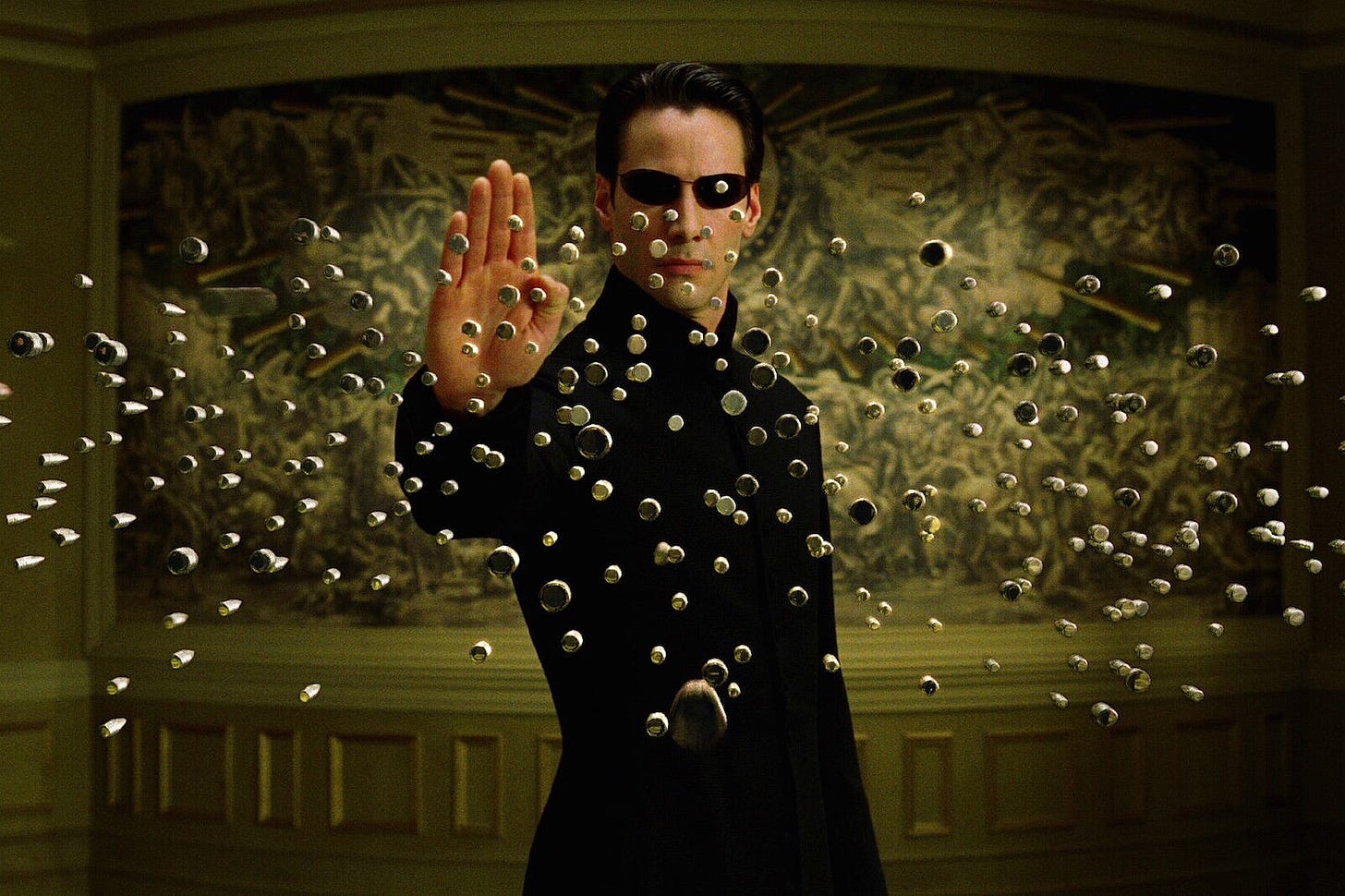This is something I’d forgotten I had in my drafts. In my last essay, Death of an Author, Death of the Author, I mentioned Hideaki Anno's background as an otaku,1 and how I have trouble with the common interpretation of Eva as a criticism, even condemnation of otaku. As it happens, here’s a fragment from an interview2 where Anno talks about that:
Sato: Anno-san, you’ve said that you hate otaku, haven’t you.
Anno: It’s not hate. It’s just that I think otaku are uncool. To otherwise not notice that you’re uncool or purposefully suppressing that fact makes me feel disgusted.
Sato: What about The Matrix? Isn’t that a cool otaku movie?
Anno: That one is also uncool.
Hagio: Even though Keanu Reeves is cool.
Anno: Keanu is cool. Because he is not an otaku. The otaku are the Wachowskis. They can’t get out of the confinements of their otaku-ism. So for example, even if they make something cool, part of it will for certain be otaku-like. Even though I say this I don’t hate it. If I truly did I’d quit being an otaku.
I don’t read this as a condemnation of otaku, especially given that last sentence. I’m not totally sure that what follows adequately reflects what Anno’s talking about, which is more about self-awareness and pretense. He seems to see the Matrix movies as putting up a front as something other than the incredibly nerdy movies they actually are. Keanu doesn’t have any pretense; he’s just being himself. But Anno’s comment about “the confines of otaku-dom” definitely got me thinking, and this reflection is the result.
In Japan, there’s a TV show called Naoki Urasawa’s Manben3—where the creator of 20th Century Boys profiles and interviews fellow manga artists. What eventually struck me while watching it is how non-otaku most of them are. Of course, manga isn’t necessarily an otaku activity. American comics are generally treated as primarily for nerds, prestige graphic novel creators like Spiegelman, Bechdel, etc., notwithstanding.4 But manga is fairly mainstream in Japan, and covers every genre you could imagine, and maybe a few you haven’t. So much of the manga created by the artists profiled isn’t all that nerdy, either. One might be a high school romance story; another a longrunning series about a globetrotting sniper; another a story about bicycle racing. Urasawa’s own works include an apocalyptic conspiracy story, a noir retelling of an Astro Boy story, and a series about a girl training in judo for the Olympics.
At least two of these artists, including Daisuke Igarashi, started out as oil painters before they pivoted to manga. Urasawa himself is a normie boomer who likes Bob Dylan and the Beatles, as seen in his collection Sneeze. Yoshikazu Yasuhiko seems as interested in writing historical dramas as about Gundam, which he helped create. Osamu Tezuka (profiled via file footage; he passed away in 1989) was a physician. And horror author Junji Ito is probably the most normal, unassuming person in the bunch. Just look at his cat tower:

So I’ve definitely wondered before if, as Anno suggests, there is something confining about otakudom, or nerddom, or whatever you want to call it. Once, a long, long time ago, I met a fellow aspiring SFF writer at a coffee shop, and he remarked that he only read science fiction. All I could think afterwards was “Why limit yourself?” More recently--as in, within the last week--I read an article on "Late Star Trek," about how corporate culture and fandom inadvertently worked together to turn the franchise into a chaotic mess, in part through fixation on canon rather than actual storytelling. The article quotes Adam Kotsko:
I found in my discussion with fans that they resisted the idea that there was symbolism or that there were themes discussed, or even that there were patterns or that there was intentional structure to things. They want it to be a newspaper from a fictional universe. […] But it’s also the distorted incentives that the idea of canon gives them—that they're rewarded for their memorization of facts, but they don’t get the same type of rewards for actually understanding how the stories work or why we care.
I’ve had that feeling before with some fannish media—that something is only happening so that someone, somewhere in the audience will do this:
More recently, at a local convention, some authors came with an interesting challenge. They had given three AIs a story prompt, then wrote their own stories based on the same prompt, inspired by a story from The Martian Chronicles. Could you, the fans, tell them apart? Though it was a little challenging, I could. The giveaway was that the real authors brought in their own idiosyncrasies—they drew from life, from other genres, from philosophy and religion—while the AIs simply averaged out what they knew about Mars and science fiction. To me, writing from a limited reference pool, reading totally within your genre, leads to that latter result.
Many of the great science fiction writers weren't just science fiction writers. Many, like Arthur C. Clarke and Isaac Asimov, were scientists in their own right. Cordwainer Smith was actually Paul Linebarger, who literally wrote the book on psychological warfare. James "Alice B. Sheldon" Tiptree, whom I discussed previously, had a background in art and design, the CIA, and as a child, exploring central Africa with her parents. Then you have Ray Bradbury, who went to the library instead of college. They were able to draw on things outside of the world of sci-fi pulps, which in turn made their sci-fi stronger.
And Tolkien and Lewis, of course, weren't trying to write Fantasy novels as we know them today. They weren't trying to satisfy the requirements of particular marketing categories. They were trying to create their own fairy tales, and were drawing on mythology and history and linguistics to do it.
And, you know, I have my preferences in writing—mostly science fiction and fantasy, mostly about kids and teens (what can I say, they make fun protagonists)—but I try to read as broadly as I can. When I wrote Feast of the Sisters, my primary inspiration was the video game Castlevania: Rondo of Blood. Other things I had in mind while writing included Dracula (natch), It, Stranger Things, Dostoevsky's "Grand Inquisitor," the temptations of Christ, Shusaku Endo's Silence, St. Silouan the Athonite, my mom's hometown, the article "Transylvanian Superstitions" (itself an influence on Dracula), among other things. Some things I didn't get around to exploring are now finding their way into my in-progress sequel. I never had any intention of merely writing a Maria Renard fanfic with the serial numbers filed off.
Like, it’s one thing if you’re really into anime or video games or giant robots. I sure am. But the best stories are about something beyond themselves—in fact, I have a draft of an upcoming post about how the Macross franchise accomplishes this. Recently I finally watched Anno’s Shin Ultraman, which on one hand is about a giant from outer space fighting big monsters. It’s written by Hideaki Anno, who once made an Ultraman fan-film, and built the climax of this movie off an obscure fandom in-joke. But it’s also still about the central idea of the Ultraman franchise, that humanity is worth protecting at all costs, to the point where the death of even a single human is able to move Ultraman to risk everything for Earth.
So I wouldn't say there's anything wrong with being a nerd. But when Anno talks about otaku being uncool, I suspect this is something like what he’s getting at. If you aspire to be a creator, you need to spread your net wider and deeper for inspiration, including outside mainstream nerd culture,5 even maybe outside your comfort zone. To put it another way: it's better to be a nerd for many things. A Renaissance Nerd, as it were.
Long story short, "otaku" is basically the Japanese word for "nerd" or "geek." There are some culture-specific shades to that, but that's the bare bones of it.
This seems to be the source: https://blcriticalstudies.wordpress.com/2024/06/15/a-conversation-between-moto-hagio-hideaki-anno-and-shimako-sato/
I’m pretty sure “Manben” is short for “Manga Benkyō,” or “manga studies.” You can watch some officially translated episodes at the link.
For some reason, it’s always kind of bothered me that the primary genre for “prestige” graphic novels tends to be memoirs. I’m not really sure why.
Man, how's that for an oxymoron?






